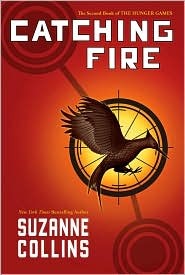Set in the fictitious, post-America country of Panem, Suzanne Collins’ dystopian adventure novel “”The Hunger Games”” has garnered readers in droves with its refreshing combination of convincing characterization, pointed political commentary, and ability to be everything young adult bestsellers often aren’t: smart, probing and important.
The follow-up in the series, “”Catching Fire,”” is the sophomore novel in a proposed trilogy, and was released Sept. 1. Though the shock of Collins’ interesting concept and the newness of her rich world are inevitably diminished, this sequel is still alive and cracking with all the aspects that made readers love “”The Hunger Games.””
When we last saw plucky protagonist Katniss Everdeen, she had just saved her own life and changed history as the contestant in the televised Hunger Games, in which one male and one female youth from each of the twelve districts of Panem must fight until only one is left alive. These events are chronicled in the delightful and dizzingly fast-paced “”The Hunger Games”” (which comes highly, highly recommended).
When “”Catching Fire”” opens, Katniss is hardly without trouble: she may have managed to save her own life and, for the first time ever, also the life of another tribute. But instead of seeing this as an act of heroism, the highly oppressive government in the Capitol sees it as a threat.
The disgruntled citizens who have been toiling for years in the Orwellian Districts seize Katniss’ act of self-preservation and use it as a symbol and a call for an uprising. Katniss and her loved ones spend the duration of the action-packed plot trying to keep themselves alive. One wouldn’t expect such grim odds to be entertaining, but they really are.
The stakes of Collins’ novel are ludicrously high and Sophoclean in nature, but that’s exactly what makes her world so compelling. Katniss has to conduct herself with such planning and restraint just to keep her family safe from the guns of the government; it’s mesmerizing for the reader to be inside her head. She is also a refreshingly smart, brave and realistically heroic: Katniss is not one to await rescue or cower in fear. She is strong and resourceful, yet she shows weakness. Collins has not in any way written a feminist piece, just an adventure novel that gives men and women equal ability and equal chance.
It is Katniss’ weaknesses that make readers want to root for this perpetual underdog. She is made vulnerable by how much she loves her little sister, Prim, when the corrupt government uses the sound of Prim’s screams to make Katniss lose focus in battle.
Katniss’ desperation at her beyond-unfortunate situation is so gripping and her desire for a better world is so poignant and honest that the reader can’t help but hope that she survives — and keeps reading to find out if she does.
“”Chasing Fire”” does not escape all the pitfalls of the young adult genre, but it comes so close that the infrequent light moments are an endearing reprieve to all the plotting, death and destruction. A love triangle between Katniss, the fellow surviving Hunger Games contestant and a childhood friend is especially well done. Instead of the usual cloyingly sweet or overly sexualized relationships in which authors cast teen characters, Collins portrays love with both youthful lightness and convincing emotional depth.
There is an undercurrent of real-life political commentary, like maybe Collins’ grim world is an allegory of, or theoretical future for, what might happen due to problems in our world today. Though her questioning of large government, beauty, culture and modern attitudes of capitalism are well taken, one can’t help but wonder which parts of the American government Collins is trying to criticize. She certainly skewers American society and media through the heart with her deliberately comparative world, but Collins is a bit too guarded for her reader to really be awakened or inspired about a specific issue in the real, current-day United States.
Collins’ societal commentary aside, this book is a delight and thrill to read. Readers may not feel quite the same degrees of hardship, manipulation, ecstasy and agony as the brave and believable Katniss, but they will undoubtedly close this book with new questions to ponder.
“”Catching Fire”” has been on shelves for just over one week and readers are already clamoring for the fiery conclusion of Collins’ twisted, touching trilogy.









